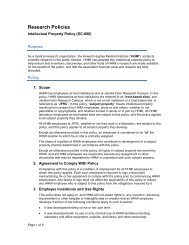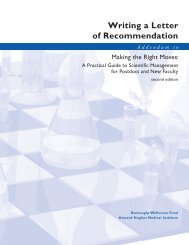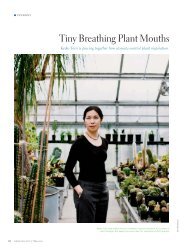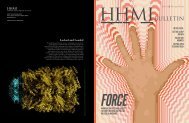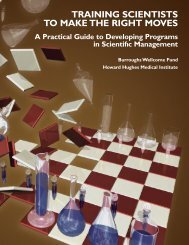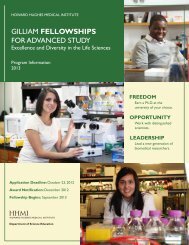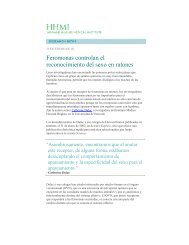Bruce D. Walker, MD - Howard Hughes Medical Institute
Bruce D. Walker, MD - Howard Hughes Medical Institute
Bruce D. Walker, MD - Howard Hughes Medical Institute
Create successful ePaper yourself
Turn your PDF publications into a flip-book with our unique Google optimized e-Paper software.
Biographies<br />
Institutional leadership<br />
photography by Barbara Ries photography by Paul Fetters photography by <strong>Bruce</strong> Weller<br />
Thomas R. Cech, Ph.D.<br />
Thomas R. Cech is president of the <strong>Howard</strong> <strong>Hughes</strong> <strong>Medical</strong> <strong>Institute</strong>. He is also a distinguished<br />
professor of chemistry and biochemistry at the University of Colorado, Boulder.<br />
Cech’s research on ribonucleic acid (RNA) has revolutionized the understanding of the biological<br />
role of this genetic material. Prior to his work on RNA, most scientists believed that proteins<br />
were the only catalysts in living cells. A series of experiments done independently by Cech and<br />
by Sidney Altman at Yale University revealed that RNA could also act as a biologic catalyst called<br />
a ribozyme. In 1989, Cech and Altman shared the Nobel Prize in Chemistry for discovering the<br />
catalytic properties of RNA. Cech is a member of the National Academy of Sciences and the<br />
<strong>Institute</strong> of Medicine, and among his other honors are the Lasker Basic <strong>Medical</strong> Research Award<br />
and the National Medal of Science.<br />
Malegapuru William Makgoba, M.B.Ch.B., D.Phil.<br />
Malegapuru William Makgoba is vice-chancellor and principal of the University of KwaZulu-<br />
Natal (UKZN) in Durban, South Africa.<br />
A molecular immunologist, Makgoba’s research has made seminal contributions to identifying<br />
and understanding the cell surface molecules and genes important in the human immune system’s<br />
response. A global leader in HIV vaccine research, he has served in the leadership of the South<br />
African AIDS Vaccine Initiative, as founding chair of the UNAIDS/World Health Organization<br />
African Aids Vaccine Programme, and as a founding member of the Global HIV Vaccine<br />
Enterprise. Makgoba joined the former University of Natal as its first black vice-chancellor and<br />
principal in 2002, after serving as the first black president of the <strong>Medical</strong> Research Council of<br />
South Africa for four years. In addition to the Caring Physicians of the World award from the<br />
World <strong>Medical</strong> Association, he is the recipient of numerous honors, including fellowships at both<br />
the Imperial College Faculty of Medicine and the Royal College of Physicians of London. He<br />
is a founding member of the Academy of Science of South Africa and a foreign associate of the<br />
<strong>Institute</strong> of Medicine.<br />
Robert Tjian, Ph.D.<br />
Robert Tjian is president-elect of the <strong>Howard</strong> <strong>Hughes</strong> <strong>Medical</strong> <strong>Institute</strong> (HHMI). He is also a<br />
professor of biochemistry and molecular biology at the University of California, Berkeley, where<br />
he has been an HHMI investigator since 1987.<br />
Tjian studies the biochemical steps involved in controlling how genes are turned on and off. He<br />
discovered proteins called transcription factors that bind to specific sections of DNA and play a<br />
critical role in controlling how genetic information is transcribed and translated. Tjian joined the<br />
Berkeley faculty in 1979 and served as director of the Berkeley Stem Cell Center and the Li Ka<br />
Shing Center for Biomedical and Health Sciences. At Berkeley, he spearheaded a major initiative<br />
to implement new paradigms for bioscience teaching and research. Tjian is a member of the<br />
National Academy of Sciences and has received many awards, including the Alfred P. Sloan Prize,<br />
the Louisa Gross Horwitz Prize, and California Scientist of the Year.<br />
Corporate Identity<br />
MANUAL
Project leadership<br />
photography by Cedric Nunn<br />
photography by Paul Fetters<br />
photography by Paul Fetters<br />
Salim S. Abdool Karim, M.B.Ch.B., Ph.D.<br />
Salim S. Abdool Karim is pro vice-chancellor for research at the University of KwaZulu-Natal<br />
in Durban, South Africa. He is also director of the Centre for the AIDS Programme of Research<br />
in South Africa (CAPRISA), a professor at Columbia University, and an adjunct professor at<br />
Cornell University.<br />
A clinical infectious disease epidemiologist, Abdool Karim has done research on tuberculosis<br />
and HIV treatment that shaped the current therapeutic approach to treating co-infected patients.<br />
He is a co-inventor of part of South Africa’s first HIV subtype C vaccine and subsequently led<br />
the first HIV vaccine trial in South Africa. Abdool Karim’s recent research on microbicides<br />
showed that an antimicrobial gel may prevent HIV infection in women. He is chair of the<br />
World Health Organization (WHO) Scientific Advisory Group for Reproductive Health and<br />
is a member of the WHO Expert Advisory Panel on Sexually Transmitted Infections and HIV.<br />
Peter J. Bruns, Ph.D.<br />
Peter J. Bruns is vice president for grants and special programs at the <strong>Howard</strong> <strong>Hughes</strong> <strong>Medical</strong><br />
<strong>Institute</strong>, where he oversees the <strong>Institute</strong>’s programs to strengthen science education at all levels,<br />
advance public understanding and appreciation of science, and broaden access to science. He<br />
was integral in the creation of HHMI’s South Africa initiative and continues to help direct the<br />
program.<br />
Before joining HHMI, Bruns was a faculty member in genetics at Cornell University for more<br />
than 30 years. His research focused on the genetics and molecular biology of the single-celled<br />
organism Tetrahymena thermophila, and he pioneered methods to manipulate the unusual nuclear<br />
composition of these organisms. In addition, Bruns earned a national reputation for his efforts<br />
to improve science education for students at all levels. He established the Cornell <strong>Institute</strong><br />
for Biology Teachers, which is designed to strengthen high school science instruction. He also<br />
expanded opportunities for Cornell students to conduct original laboratory research in biology<br />
and related disciplines. He came to HHMI in 2001.<br />
Jack E. Dixon, Ph.D.<br />
Jack E. Dixon is vice president and chief scientific officer of the <strong>Howard</strong> <strong>Hughes</strong> <strong>Medical</strong><br />
<strong>Institute</strong> (HHMI), where he directs its flagship investigator program, which provides leading<br />
U.S. scientists the resources, time, and freedom to pursue challenging questions.<br />
Dixon came to HHMI in 2007 from the University of California, San Diego School of Medicine,<br />
where he served as dean of scientific affairs. His research has focused on a group of proteins<br />
that govern a key biochemical reaction called phosphorylation, which serves as a signaling<br />
mechanism between living cells. In 1973, he began his first faculty position in Purdue University’s<br />
biochemistry department. He moved to the University of Michigan in 1991 and later became<br />
co-director of Michigan’s Life Sciences <strong>Institute</strong>. Dixon is a member of both the <strong>Institute</strong> of<br />
Medicine and the National Academy of Sciences and formerly served on HHMI’s <strong>Medical</strong><br />
Advisory Board.<br />
Corporate Identity<br />
MANUAL
photography by Sean Kernan<br />
photography by Paul Fetters<br />
photography by Steve Gilbert<br />
William R. Jacobs, Jr., Ph.D.<br />
William R. Jacobs, Jr., is a professor of microbiology and immunology and a professor of<br />
molecular genetics at the Albert Einstein College of Medicine, and a <strong>Howard</strong> <strong>Hughes</strong> <strong>Medical</strong><br />
<strong>Institute</strong> (HHMI) investigator.<br />
Jacobs is an expert in tuberculosis and other diseases in the mycobacteria family. His research<br />
uses bacterial viruses—called phage—to introduce foreign DNA into the bacteria that cause TB,<br />
Mycobacterium tuberculosis. That work has revolutionized scientists’ understanding of TB bacteria.<br />
Prior to Jacobs’ development of gene transfer mechanisms, little was known about the genetics<br />
behind M. tuberculosis, including which genes were related to virulence and drug resistance.<br />
Jacobs and former Einstein colleague and HHMI investigator Barry Bloom collaborated on a<br />
series of experiments that led to the first genetic manipulation of M. tuberculosis. Jacobs, who did<br />
his doctoral dissertation studying leprosy, is currently developing a multipurpose vaccine that<br />
could attack malaria, HIV, and tuberculosis.<br />
Adriaan Willem Sturm, M.D., Ph.D.<br />
Adriaan Willem Sturm is dean of the Nelson R. Mandela School of Medicine at the University of<br />
KwaZulu-Natal in Durban, South Africa. He is also interim director of the new KwaZulu-Natal<br />
Research <strong>Institute</strong> for Tuberculosis and HIV (K-RITH).<br />
During his career as a medical microbiologist, Sturm has studied tuberculosis, HIV, and sexually<br />
transmitted diseases. He was a leading scientist investigating the first outbreak of extremely drug<br />
resistant tuberculosis (XDR-TB) in KwaZulu-Natal province and a principal investigator on<br />
the project that sequenced the genetic code of that pathogen. Sturm began his research career<br />
in the Netherlands and became chair of the microbiology department at Aga Khan University<br />
in Pakistan in 1990. He came to the University of KwaZulu-Natal in 1993 and has served as a<br />
professor, head of the medical microbiology department, and dean. Sturm is also director of the<br />
<strong>Medical</strong> Research Council’s genital ulcer disease research unit at the university.<br />
<strong>Bruce</strong> D. <strong>Walker</strong>, M.D.<br />
<strong>Bruce</strong> D. <strong>Walker</strong> is a professor of medicine at Harvard <strong>Medical</strong> School and a physician at<br />
Massachusetts General Hospital (MGH). He is also a <strong>Howard</strong> <strong>Hughes</strong> <strong>Medical</strong> <strong>Institute</strong><br />
investigator and director of the newly formed Ragon <strong>Institute</strong> of MGH, the Massachusetts<br />
<strong>Institute</strong> of Technology, and Harvard.<br />
<strong>Walker</strong>’s research focuses on how the immune system controls chronic viral infections, with an<br />
emphasis on HIV. He leads an international effort to understand how rare people can fight off<br />
HIV infection without treatment. <strong>Walker</strong> routinely works in South Africa, where he is an adjunct<br />
professor at the Nelson Mandela School of Medicine at the University of KwaZulu-Natal in<br />
Durban. There, he collaborates with the Doris Duke <strong>Medical</strong> Research <strong>Institute</strong> and serves as a<br />
principal investigator in the HIV Pathogenesis Program, which studies the evolution of HIV and<br />
of the immune responses that are effective in controlling the virus. He also contributes to training<br />
the next generation of African scientists.<br />
Corporate Identity<br />
MANUAL




